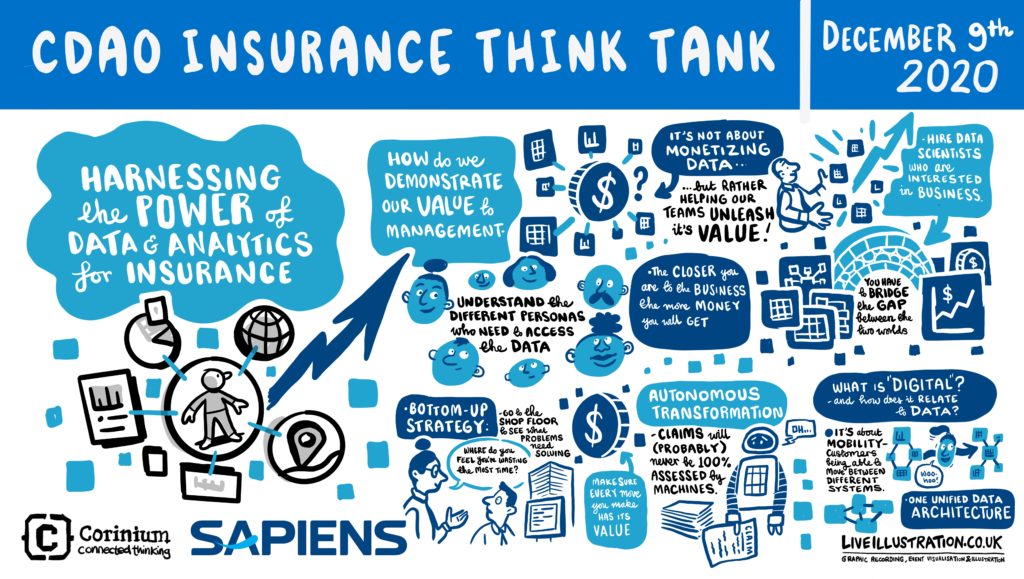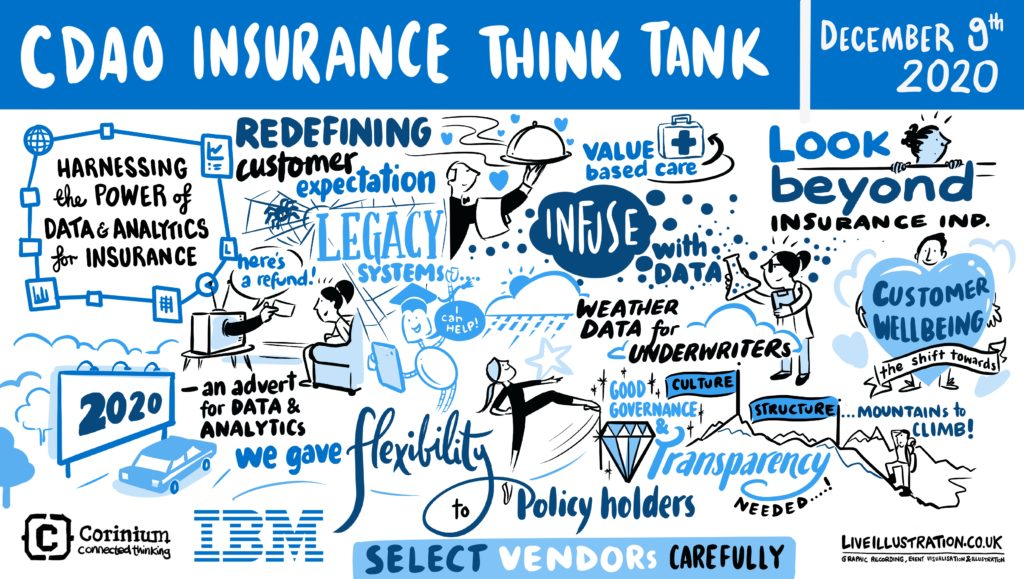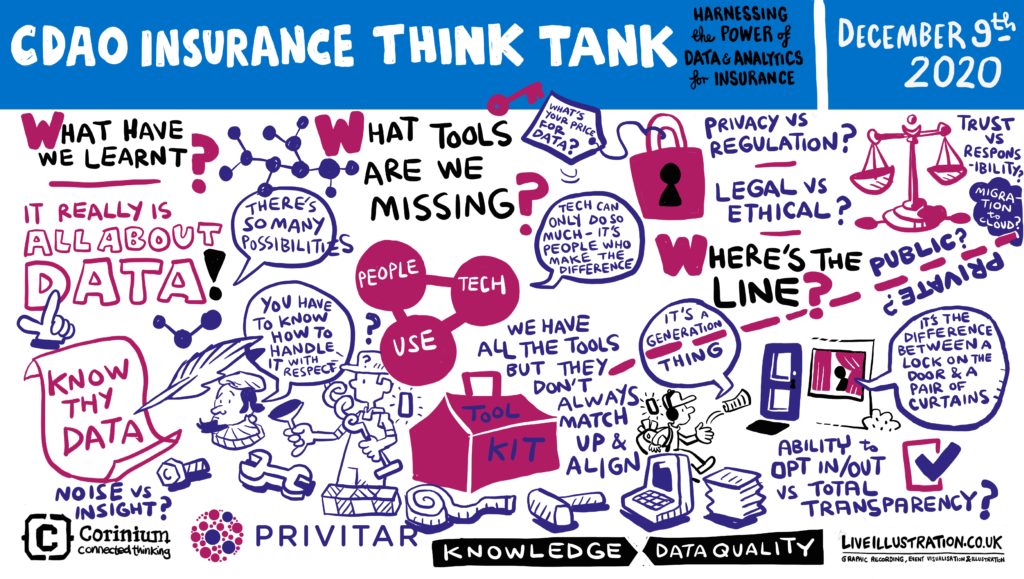Three Ways Insurance Sector AI Use will Evolve in 2021

Data and analytics leaders in the US gathered at the CDAO Insurance Virtual Think Tank to discuss how technology is revolutionizing the industry
Earlier this year, we reported that more than 80% of insurance leaders think that AI technologies will drive better customer engagement and create better employee experiences. But of course, realizing those benefits in any sector is often easier said than done.
That's why how to take advantage of the latest innovations in AI and implement new technology successfully were key topics at last week’s CDAO Insurance Executive Think Tanks.
“Technology for technology’s sake does not really take us to a happy place, unless we are able to bring the people along,” noted Prashant Natarajan, Director of Data Science and Analytics at employee benefits provider Unum. “That means [dealing with] their apprehensions but also getting them excited, because both of those things exist in equal measure whenever you roll out the subject of technology.”
While the CDAO Insurance Executive Think Tanks were held under Chatham House rules, we have created this article to share three of the key topics discussed at the event, along with quotes from the public opening and closing panels.

BI is Enhancing Relationships Between Insurers and Agents
As many of our panelists agreed, getting more insights and analytics into the hands of agents is an excellent way to make them more efficient.
“One thing we’re doing that we started pre-COVID is developing dashboards for our agents so they can look at their book of business with us visually,” said Tom Warden, Chief Data and Analytics Officer at Employers Insurance. “They can drill into some of that information, and we provide them with pre-packaged analytics.”
New AI techniques have the potential to further enhance the relationship between insurance companies and agents, according to Alejandro Zarate, Faculty for the Master of Insurance Program at Columbia University.
“I see a lot of opportunity for proactive benchmarking or proactive business intelligence,” he said. “For example, you can leverage AI to identify upcoming renewals, and run all the analytics and business intelligence that you would usually do in a dashboard and make it available to your user.”
The objective for insurance industry leaders is not to replace agents with AI and ML technologies, but rather to enhance the work they do and make them more productive.
“In the insurance space the agent or the underwriter is definitely a critical value-add in a lot of places," said Policygenius Head of Data Daniel Gremmell. "But how can we make them better? How can we get data into their hands, help drive more intelligence in their process and automate what they do?”
“If you can get them to handle three to four more applications a day, just imagine what that does to your business when you scale that across the rest of your agents,” he concluded.

How AI and ML Technologies Will Impact Insurance Claims
There are several AI and ML technologies that are poised to improve the way that insurance companies personalize their interactions with their customers and improve the customer experience.
Zarate explained that the three technologies he expects to make the biggest impact are computer vision, natural language processing and recommendation engines.
“[These] systems are extremely powerful because they help [your customers] to understand what else they could be buying or what insurance is right for them,” he said. “[This technology] can also help insurers recognize what kinds of clients are similar, like in clusters, and do better benchmarking. There are so many applications for this.”
Some insurance companies are already using AI in the field to improve the outcomes for their customers. For example, Aegis General Insurance Agency has been using AI to improve response times during natural disasters.
“We’ve been able to roll out some AI into our models and bring in external data, especially for weather-related exposures,” said Aegis General Insurance Agency SVP Data Science Dan Marzouk. "Our big change has been on the claims side."
“[By] utilizing our predictive models to predict where and when certain weather events may happen [we can] prep our claims team much earlier for the potential impact of hurricanes, tornadoes and floods,” he continued. “That has allowed us to get boots on the ground much earlier, and that has had a significant impact on our customers in a positive way.”

It is Time to Talk About the Ethics of AI in Insurance
While AI initiatives are full of promise for insurance companies, the technology also comes with significant responsibilities. As insurers use AI more and incorporate external data sources into their systems, it will be vital for them to consider both the fair use of data and the ethical implications of these practices for customers.
“We sometimes think about data as just bits and bytes which represent objective truth, but it rarely is,” said Natarajan. “Data is created by humans, created for humans or created by systems that humans create.”
He warns that implicit bias in datasets may not only cause negative discrimination but could also lead to positive discrimination of one group over another.
“Understanding and accepting that data is inherently biased allows us to take a more objective view of why we need to put programs in place in order to manage that data,” he concludes.
“[Data] ethics is something we think about a lot," added Gremmell. "Things that can happen with your machine learning algorithms where they start to learn inherently biased patterns depending on what you introduce them to.”
“If you inject a machine learning model into an automated process and it makes decisions consistently enough then you inherently create biased data and a predetermined outcome,” he warned. “So, we inject an element of randomness back into our datasets to allow for forms of exploration or the picking up of new patterns.”
“It’s not just what the letter and the spirit of the law says, it’s about doing the right thing,” added Natarajan.
“Ethics is something we do when nobody else is watching," he concluded. "I think any ethical program or use of data should look at both equality of treatment, as in how the data is used, and equality of outcomes, which is making sure that the outcomes are fair.”
To view the opening and closing panel of this year’s CDAO Insurance Executive Think Tanks and discover even more essential insights, click here now


.png?width=352&name=Featured%20Images%20(20).png)
